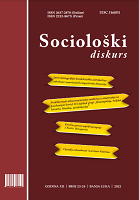PHILOSOPHY OF SEXUALITY AND L’ÉCRITURE FEMININE
PHILOSOPHY OF SEXUALITY AND L’ÉCRITURE FEMININE
Author(s): Dijana ZrnićSubject(s): Gender Studies, Social Philosophy, Contemporary Philosophy, Structuralism and Post-Structuralism, Psychoanalysis, Theory of Literature
Published by: Naučno udruženje Sociološki diskurs
Keywords: l’écriture féminine; philosophy; literature; poststructuralism; psychoanalysis; deconstruction; sexuality;
Summary/Abstract: In her work, the author problematizes, but also tries to shed light on, the phenomenon of female sexuality and the place and role of women in the symbolic space, by entering into a dialogue with representatives of l’écriture féminine (“women’s writing”), as a French branch of feminist philosophical-literary theory from the beginning of the 70s. those years of the 20th century. The first findings resulting from this polemical discussion reveal that the subject of interest of the theory of “women’s writing” is the inscription of the female body and female diversity in structural language and text, by means of deconstruction as a post-structuralist method. It will be shown that the search for a “hidden signifier” in language, which tends to express the unspeakable, implies a critical review of philosophical, psychoanalytic, and literary-theoretical positions on the development of female sexual identity, as well as on the role of women in the symbolic order. Thus, Foucault’s texts question the archeology of sexuality in the narrative, under the strong influence of psychoanalysis. French psychoanalysts, led by Freud, through the phenomenon of hysteria, which Foucault reinterprets as a phenomenon of self-misunderstanding, open the way to consider the misunderstanding of one’s own desire and one’s own sexuality, while literary theorists in parallel introduce the discursive production of knowledge about sexuality, emphasizing the ubiquitous misunderstanding and exclusion of female sexuality. from the standard male language code. In the end, the author concludes that in the androcentric language, women are defined as “other”, and that they must enter into a dialogue with their otherness in order to reaffirm such an understanding of themselves and their sexuality.
Journal: Sociološki diskurs
- Issue Year: 12/2023
- Issue No: 23-24
- Page Range: 61-74
- Page Count: 14
- Language: English

